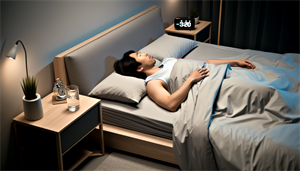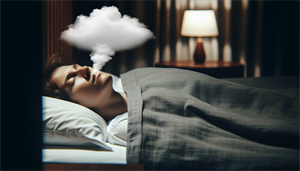Snoring, often associated with overweight and obesity, is a common phenomenon that disrupts the quiet of night-time slumber. But does this mean that slim people are immune to this nocturnal nuisance? In reality, snoring is an indiscriminate disruptor, affecting individuals of all body types, including those with a slender physique.
It’s important to ask, “do thin people snore?” as it’s a symptom of a serious sleep disorder, such as sleep apnea, which can affect anyone, regardless of their weight.
Key Takeaways
-
Snoring is influenced by multiple factors such as airway anatomy, lifestyle habits, and health conditions, and it can affect slim individuals, dispelling the misconception that it only affects those with excess weight.
-
Sleep apnea, including obstructive and central types, can also impact slim individuals, with symptoms and risks often going unrecognized due to assumptions about body weight.
-
Management of snoring in slim individuals should include improving sleep habits and lifestyle changes, and if these are unsuccessful, one should seek medical advice for potential underlying health issues and professional treatment options.
The Surprising Truth About Snoring in Slim Individuals

Contrary to popular belief, snoring isn’t a problem limited to those with excess weight. Indeed, the idea that slim individuals aren’t prone to snoring or sleep apnea is a misconception. This erroneous belief often leads to these conditions being overlooked in slim individuals, who may be less likely to perceive themselves as being at risk. The reality is that the factors contributing to snoring are multi-faceted, often involving elements such as airway anatomy, lifestyle habits, and other health conditions.
Regardless of body type, airway anatomy significantly influences snoring. Some factors that can contribute to snoring include:
-
Having a narrower airway
-
Relaxed throat muscles during sleep
-
Nasal congestion
-
Obesity
-
Alcohol consumption
-
Sleeping position
These factors can cause the airway to collapse, leading to snoring.
In addition to anatomical factors, lifestyle habits and other health conditions can influence snoring in slim individuals. Poor sleep habits, alcohol consumption, and smoking can all contribute to the likelihood of snoring, irrespective of body weight.
The Reality of Airway Anatomy
The human airway system is a complex network, encompassing various parts from the nose and nasal cavity to the trachea, bronchi, and lungs. Any obstructions or abnormalities in this system can contribute to snoring. For instance, having a narrower airway or enlarged tonsils can cause the airway to partially or fully collapse during sleep, leading to snoring. Alcohol consumption can further exacerbate the problem, as it can relax the muscles in the throat and airway, leading to increased snoring.
The impact of airway anatomy on snoring is not limited to individuals with a higher body weight. Slim individuals can also possess anatomical characteristics, such as narrow airways or enlarged tonsils, that contribute to snoring. Adapting certain lifestyle changes and sleep habits can help alleviate snoring in such cases.
Lifestyle Factors That Contribute to Snoring
Lifestyle factors significantly influence the likelihood of snoring, irrespective of body weight. For instance, alcohol consumption can cause the jaw muscles to relax, leading to snoring. Smoking is another significant risk factor. It can cause inflammation and edema in the airway, narrowing it, and resulting in obstructed airflow, leading to snoring. Moreover, smoking can decrease sleep quality, making it more challenging to fall asleep.
Sleep deprivation is another lifestyle factor that can lead to snoring. Lack of adequate sleep may cause the throat muscles to relax, potentially increasing the occurrence of snoring in slim individuals. On the other hand, maintaining a high level of physical activity can help reduce the frequency and severity of snoring. Studies suggest that individuals with lower physical activity levels are at a higher risk of snoring.
Other Health Conditions Impacting Sleep
Apart from lifestyle and anatomical factors, other health conditions can also contribute to snoring in slim people. Nasal obstructions, for instance, have a significant impact on snoring. Conditions like polyps and a deviated septum can obstruct the nasal passages, leading to snoring.
Similarly, exposure to allergens such as dust, animal dander, and pollen can lead to nasal congestion and inflammation of the airways, resulting in increased resistance to airflow and potentially causing snoring.
Hormonal imbalances, specifically reduced levels of estrogen and progesterone in women, can also result in snoring by causing the throat muscles relax in the throat and airway.
Unpacking the Relationship Between Body Weight and Snoring

While it’s true that obesity can contribute to snoring, the relationship between body weight and snoring is far from straightforward. This relationship involves a myriad of factors beyond just body mass index (BMI) and fat distribution. Abdominal fat, for instance, can cause the diaphragm to be pushed upward, compress the ribcage, and restrict airflow, resulting in snoring.
However, one should understand that the relationship between body weight and snoring isn’t merely about the scale’s number. Other factors, such as age, gender, and even neck circumference, can also play a significant role in snoring, affecting individuals with a normal BMI.
Beyond BMI: Understanding Other Risk Factors
Although BMI is frequently used as a quick reference for assessing health risks, it doesn’t provide a complete picture when it comes to snoring. Age, for instance, has a significant impact on the likelihood of snoring. As individuals age, the likelihood of snoring increases due to the decline in muscle tone related to aging and alterations in airway tissues. Additionally, gender plays a role in the prevalence of snoring, with men showing a higher prevalence compared to women, though this disparity tends to decrease with age.
Furthermore, neck circumference serves as a crucial measure for evaluating body-fat distribution in the neck area, which is pertinent to snoring. Variations in fat distribution can impact snoring, even among individuals with similar BMIs.
The Role of Fat Distribution in Snoring
Fat distribution, especially around the neck, can significantly impact snoring. The distribution of fat in this area can result in the constriction of the upper airway during sleep, making it challenging for air to flow smoothly. This constriction leads to vibrations and snoring. Additionally, the pressure from the constricted airways and fat around the chest and midriff can impact the diaphragm, reducing lung capacity and worsening the issue.
Apart from the neck, fat distribution in other areas, including the abdomen and overall upper airway region, can lead to increased snoring by restricting air passage. It’s important to note that while fat distribution can impact snoring, it is not the sole determinant. Other factors, such as airway anatomy and lifestyle habits, also play a significant role.
How Sleep Apnea Affects Thin People

Even though it’s less documented, sleep apnea can affect individuals with lower body weight. This condition involves a cessation of breathing during sleep, leading to decreased oxygen in the blood, which can be potentially life-threatening if left untreated. Slim individuals can experience a range of sleep apnea types, such as obstructive sleep apnea (OSA) and central sleep apnea (CSA).
Apart from excessive weight, other contributors to sleep apnea include anatomical features like a narrow airway, lifestyle factors, and other health conditions impacting sleep breathing. Therefore, it’s essential to recognize the symptoms of sleep apnea in slim individuals, as early detection can lead to effective management and treatment.
Differentiating Between Sleep Apnea Types
There are two main types of sleep apnea: obstructive sleep apnea (OSA), also known as obstructive sleep apnoea, and central sleep apnea (CSA). OSA is attributed to a physical blockage or obstruction of the airway during sleep, while CSA is a consequence of the brain’s failure to signal the muscles responsible for breathing. While OSA is more prevalent in overweight individuals, central sleep apnea can impact slim individuals, as it is connected to the brain’s communication with breathing muscles and is not necessarily linked to body weight.
Regardless of the type, sleep apnea can have serious health implications if left untreated. Symptoms such as:
-
daytime sleepiness
-
loud snoring
-
morning headaches
-
chest pains at night
Certain symptoms could indicate the presence of cardiovascular disease and should not be ignored.
Recognizing Symptoms of Sleep Apnea in Slim Persons
Recognizing the symptoms of sleep apnea in slim individuals is crucial for early diagnosis and treatment. These symptoms can encompass morning headaches, unrefreshing sleep, snoring, poor sleep quality, daytime fatigue, sleepiness, and other symptoms such as waking up feeling like gasping or choking. Less prevalent but important symptoms of sleep apnea in slim individuals encompass anxiety, depression, hyperactivity, irritability, and difficulty concentrating.
Sleep apnea, a serious sleep disorder, can significantly affect the sleep quality of individuals with a lower body mass index, causing interruptions in breathing and sleep, resulting in daytime fatigue and other symptoms commonly associated with poor sleep quality and bad sleep habits. If you or someone you know experiences these symptoms, it’s crucial to seek medical advice promptly to assess the situation and determine the most appropriate course of action.
Investigating Snoring Causes in Lean Populations

The causes of snoring in lean populations can be multifaceted, involving both genetic and environmental factors. While the influence of genetic factors on snoring in lean individuals is not fully understood, certain genetic and ethnic factors have been associated with an increased likelihood of snoring, including:
-
Family history of snoring
-
Narrow airways
-
Enlarged tonsils or adenoids
-
Obesity
-
Alcohol consumption
-
Smoking
-
Sleep position
In addition to genetics, environmental factors can significantly influence snoring in lean populations. Allergens such as pollen, mites, animal dander, and fungal allergens are recognized for causing increased snoring problems in specific populations or geographical locations. Exposure to such allergens can lead to nasal congestion and inflammation, which can in turn lead to snoring.
Genetic and Ethnic Considerations
Genetic factors can play a significant role in predisposing slim individuals to snoring. Specific genes have been identified to be associated with snoring-related traits in slim populations. Furthermore, if there’s a family history of snoring or obstructive sleep apnea, slim individuals are at an elevated risk of developing these conditions themselves.
Ethnicity can also influence the likelihood of snoring in slim individuals. Studies indicate that racial and ethnic minorities may have an increased risk of sleep disorders, including snoring. However, the precise factors connecting ethnicity and snoring require further research.
Environmental Allergens and Their Effects
Exposure to environmental allergens can lead to snoring even in lean individuals. Allergens such as dust, animal dander, and pollen can cause nasal congestion and inflammation of the airways, leading to increased resistance to airflow and potentially causing snoring. Symptoms commonly associated with allergen-induced snoring in lean individuals may include nasal congestion, sneezing, runny nose, and increased mucus production.
In addition to allergens, other environmental factors can also contribute to snoring in lean populations. Exposure to building dampness and air pollution, for example, can contribute to snoring. Hence, it’s essential to consider both the genetic and environmental factors when addressing snoring in lean individuals.
Strategies for Managing Snoring Without Weight Loss

Tackling snoring in slim individuals doesn’t necessarily demand drastic measures such as weight loss. Instead, it often involves adopting better sleep habits and making certain lifestyle changes. Simple steps like:
-
Sleeping on your side
-
Using nasal strips or mouthpieces
-
Selecting an anti-snore pillow
-
Ensuring a minimum of seven hours of sleep per night
-
Engaging in mouth and throat exercises
-
Abstaining from alcohol and sedatives before bedtime
Lifestyle changes, such as weight loss, adjusting sleep positions, and considering neck surgery, can all help stop snoring.
If snoring persists despite these lifestyle changes, it’s important to consult a medical professional. Persistent or worsening snoring could indicate an underlying health issue that needs to be addressed. Therefore, never ignore persistent snoring and seek help when necessary.
Improving Sleep Habits for Better Breathing
Improving sleep habits is one of the most effective ways to manage snoring in slim individuals. Drinking alcohol and sedatives, for example, can relax the muscles in the airway, increase respiratory resistance, and intensify snoring. Hence, refraining from alcohol and sedatives, especially close to bedtime, can help reduce snoring.
The position in which one sleeps can also significantly impact snoring. Here are some methods to enhance breathing during sleep for slim individuals who snore:
-
Sleeping on one’s side can enhance airflow, help prevent the airway from collapsing, and reduce the likelihood of snoring.
-
Utilizing anti-snore pillows to elevate the head.
-
Maintaining a healthy weight.
-
Engaging in regular exercise.
-
Following a balanced diet.
-
Addressing any allergies or nasal congestion that may contribute to snoring.
When to Seek Medical Advice
Even though lifestyle modifications often manage snoring, it’s important to seek professional help when required. If you experience symptoms such as:
-
daytime sleepiness
-
cognitive difficulties
-
breathing pauses during sleep
-
loud snoring
-
waking up feeling unrefreshed with a dry mouth, sore throat, fatigue, or headache
It’s important to consult a healthcare provider. Chronic snoring in slim individuals could indicate serious health conditions such as high blood pressure, heart attack, stroke, and sleep apnea, impacting overall health and quality of life.
Healthcare professionals, such as otolaryngologists, also known as ENT specialists, along with pediatricians specializing in sleep medicine and dentists, have the expertise to deal with snoring issues in patients, including those with normal body weight. Hence, if lifestyle changes do not alleviate snoring, it’s advisable to seek medical advice promptly for assessment and treatment.
Diagnostic Tools for Snoring in Slim Individuals
Various diagnostic tools, including home sleep tests and professional evaluations, can be utilized to diagnose and manage snoring in slim individuals. Home sleep apnea tests, for instance, are convenient and can be performed at home to diagnose snoring. However, these tests should be used correctly, and the results should be interpreted by a healthcare professional to ensure an accurate diagnosis.
Even though home tests can be helpful, a professional evaluation is vital for an accurate diagnosis and to determine if sleep apnea is a contributing factor to snoring. Therefore, it’s important to consult with a healthcare provider if you suspect that you or a loved one is suffering from sleep apnea.
The Efficacy of Home Sleep Tests
Home sleep tests can be effective in diagnosing sleep apnea, but their accuracy depends on proper use and patient behavior. Patient behavior, such as adherence to test instructions, sleep posture, and overall sleep quality, can significantly influence the effectiveness of these tests.
However, technical or practical factors can impact the precision of home sleep tests. Factors such as improper electrode placement or malfunctioning monitoring equipment can affect accuracy. Therefore, while home sleep tests can be a convenient and cost-effective way to diagnose sleep apnea, they should be used correctly and the results should be interpreted by a healthcare professional.
Importance of Professional Assessment
While home sleep tests are useful, a professional assessment is crucial for an accurate diagnosis of snoring. This assessment may involve procedures such as nocturnal polysomnography and flexible nasopharyngoscopy. A professional assessment ensures an accurate diagnosis and can lead to a personalized treatment plan, monitoring, and follow-up, and access to advanced technology.
Professional assessment also ensures that if snoring continues despite efforts to change lifestyle, the individual seeks medical advice promptly for assessment and treatment. The diagnosis of snoring typically involves the expertise of:
-
a sleep specialist
-
an oral and maxillofacial surgeon
-
an otolaryngologist (ENT)/head and neck surgeon
-
a pediatric sleep medicine specialist
These professionals can provide the necessary treatment options.
Summary
The common perception that slim individuals are immune to snoring is a myth that needs to be debunked. Through this blog post, we have highlighted that snoring can affect individuals of all body types, and is influenced by factors beyond mere body weight. Airway anatomy, lifestyle factors, and other health conditions can all contribute to snoring, irrespective of an individual’s physique. Recognizing this can lead to early diagnosis and appropriate management, improving the quality of sleep and overall health of individuals across the weight spectrum.
Frequently Asked Questions
Is it normal for skinny people to snore?
Yes, it is normal for skinny people to snore. Snoring can be caused by a blocked nose, regardless of weight.
How do you stop snoring if you're skinny?
You can try sleeping on your side, using nasal strips, a mouthpiece, or practice mouth exercises. Additionally, weight loss, avoiding alcohol, and quitting smoking can also help reduce snoring.
Can I have sleep apnea if I'm skinny?
Yes, even if you are skinny, you can still experience sleep apnea. It's important to seek a diagnosis if you have any symptoms, regardless of weight.
What are the typical factors contributing to snoring in slim individuals?
The typical factors contributing to snoring in slim individuals include narrow airways and relaxed throat muscles during sleep, which can lead to the collapse of the airway. This can result in snoring.
When should one seek medical advice for snoring?
If snoring causes disruptions in your sleep leading to fatigue or headaches, or if you experience instances of stopped breathing during sleep, it is important to seek medical advice promptly. Ignoring these symptoms can lead to serious health issues.


